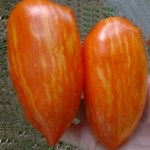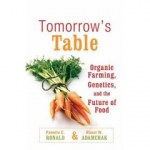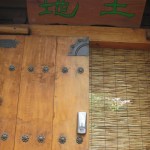biofortified
With religious wars around the world erupting almost constantly, you might be feeling grateful that you live in a country where there is separation of church and state. But dont rest too easy, another conflict is brewing- this time in agriculture.
Twenty years ago organic farmers in our area began growing specialty sunflowers to sell for cut flowers. Although most of the pollen from organic sunflowers does not travel further than 3 meters, some of it can travel up to distances of 1000 meters, which can cause problems for growers of certified sunflower seed. If stray organic pollen should…
DESPITE overwhelming evidence to the contrary, roughly one in five Americans believes that vaccines cause autism -- a disturbing fact that will probably hold true even after the publication this month, in a British medical journal, of a report thoroughly debunking the 1998 paper that began the vaccine-autism scare. says Michael Willrich, a professor of history at Brandeis University in todays NYT
Similarly, according to Dr Oz, the TV host, papaya genetically engineered with a snippet of a mild strain of a virus to make it disease free, causes infertility. This in face of overwhelming evidence…
Happy New Year!
Here is a post from Raoul at the Student Farm at UC Davis.
From the vegetable's point of view the holidays weren't that great. Continuous rain or fog was only broken up by hard frosts. Our head rot resistant broccoli varieties proved to be not as resistant as advertised, hence there is no broccoli in the Student Harvest baskets today. The good news is that greens and root vegetables are doing fine.
Today's baskets include: rutabagas, fennel, collards, delicata squash, cilantro, radicchio, Purple Haze carrots, Komatsuna, Dino kale, Chinese cabbage, beets, carinata kale,…
The Digital CuttleFish writes another good verse.
This one is for Dr. Oz.
Tomorrow's Table
I'm healthy and wealthy; I've outgrown my past;
When I need to lose weight, I can diet or fast;
Starvation is not in the lot I've been cast--
My perspective is clearly not skewed.
I can buy the best produce they've managed to breed,
Have it shipped to my doorstep with mind-boggling speed;
In a world of such plenty, I don't see the need
For genetically modified food
We can learn about foods from the Frankenstein myth
And distill what we know into substance and pith:
It's much safer, our going without…
Click here to see the Dr. Oz show on GE crops with yours truly.
I tried to provide a science-based perspective to the audience.
It was a tough go, though, because one of the other panelists (Jeffery Smith, a former Iowa political candidate for the Natural Law Party with no discernible scientific or agricultural training) believes that eating GE crops causes infertility, organ damage and endocrine disruption. Of course, the scientific evidence for these statements is about as strong as saying that looking at carrots will give you brain tumors.
Can the audience glean that from the information…
These video photoessays - one interviewing Colombian coffee growers, another Ghanaian farmers - document how a 2-degree rise in temperature has already hurt some of the world's most vulnerable people. The videos show how rising temperatures have damaged crops, led to increased pests and disease, and ultimately forced farmers to switch to less profitable crops - or even abandon their land entirely.
These are striking examples of what the future could hold: a massive human migration as breadbaskets turn into to dust bowls.
From the CGIAR Program on Climate Change, Agriculture, Food Security
Tune in and let me know how it turned out.
Find your local station and air time here.
Great article by Nicolas Kristof in the NY Times.
He writes about the promise of biofortification for saving the lives of the poor and malnourished.
Children have been dying for lack of vitamin A, iron and zinc for thousands of generations. These new seeds may finally help end the scourge of starvation in this century, on our watch. And that's a special reason to give thanks.
On Monday afternoon, yours truly will appear with Dr. Oz, "America's doctor," (the tag bestowed on him by no less than Oprah Winfrey) before a live audience in New York City. Although I have never seen the show, a New York Times magazine article written by the brilliant Frank Bruni, suggests that the show, and Dr. Oz himself, are both pretty entertaining.
As one of the most accomplished cardiothoracic surgeons of his generation, Mehmet Oz has transplanted lungs and repurposed hearts; implanted mechanical devices to provide the pump and pulse for patients that cannot manage that on their own;…
In the recent debate on sustainable agriculture, I noted that "The likelihood of pollen from GE cotton causing harm to the environment is about as likely as a poodle escaping into the wild."
Amidst the avalanche of comments, noone rebutted the peer-reviewed data indicating that biotechnology has already contributed to enhancing the sustainability of our farms as measured by environmental and socio-economic benefits. But there were several people who were concerned about the poodle.
Let me explain.
The farms here in the great Central Valley of California supply 50% of the nation's fruits and…
One more day to vote in the , which asks the question "Is Biotechnology compatible with sustainable agriculture?"
PZ Myers answers the question this way: "this is weird: agriculture is biotechnology, and just breaking ground with a sharp stick and throwing some seeds in is an example of an 'unnatural' human practice"
He also publishes the opposition's "top secret email", which has some gobbledy-gook about how farmers are turning against GE crops (um, name one?) and contaminating nature (massive reductions in insecticide use on BT cotton fields and enhanced biodiversity is destruction?). PZ…
The most devastating impact on biodiversity is caused by agriculture. Farming is already the greatest extinction threat to birds, and its adverse impacts look set to increase, especially in developing countries (Green et al. 2005).
Thus one of the global challenges for the next century is the need to develop high-yielding varieties that require minimal inputs, so that impacts on biodiversity can be minimized.
An alternative to the "high-input" approach is to expand the number of organic
farms. Because organic farmers do not use synthetic pesticides, their farms support
higher levels of…
Today is the first week of Fall quarter at UC Davis and the Student Farm has harvested some glorious vegetables.
The tomatoes in the CSA (community supported agriculture) basket today came mostly from the farm's Seeds of Change variety trial. The green striped, red striped, orange, dark striped, etc. tomatoes represent only a fraction of the 75 varieties the farm trialed
this year. There are a couple of red slicers in the mix as well. In their newsletter, the Student Farm crew (Eric, Larisa, Sasha, Ari, Ethan and Raoul) asks us customers to observe how the trial tomato varieties compare to…
We are eating well in Davis, California.
Below is an update from Raoul about the UC Davis Student Farm fall planting.
Carrots, beets, spinach, rutabagas, turnips, radishes, daikon, cilantro and fennel are in the solarized beds germinating. We also transplanted broccoli, cabbage, collards, kale, cauliflower, and kohlrabi. Fall crops are on the way.
We need now to protect them from weeds, rabbits, squirrels, bugs, and diseases. If we are successful, everyone eats. If not, the village goes hungry and we go back to hunting/gathering (which would make for an interesting CSA basket).…
Bill Gates had a lot of thoughtful things to say about technology and social innovation at the recent Techonomy conference, including a nice plug for Tomorrow's Table!
"There's a lot of great thinking [from both the GMO and organic communities], which lead to things you should care about-preserving the environments and feeding people with a decent diet."
Video:
Reinventing Capitalism: How to jumpstart what the marketplace can't
Speaker: Bill Gates, Bill & Melinda Gates Foundation Interviewed by Brent Schlender
http://link.brightcove.com/services/player/bcpid87735931001?bclid=87675…
The…
Korea has a 5000 year history of food and farming. How much can a nine-year old and her mother learn on a two week visit to this land of miracles?
For the first few nights we stayed in a tiny room in a traditional Korean house called a "Hanok" house. There is a courtyard that everyone shares that the owners have filled with lots of stuff including a rabbit named Mimi. In this quiet place, one can imagine ancient times before the rebirth of this powerful nation that was almost totally destroyed by the Korean war (1950-1953). Now, although most cities are dominated by massive buildings and…
Ed Yong recently published a post called "On the origin of science writers" asking that science writers (anyone who regularly writes about science) tell the story of how they got started. The idea is to establish a resource for future writers. I joined the thread and have reprinted it here.
As far back as I can remember I loved to read and I loved the wilderness. In fact my favorite times were reading in the wilderness, preferably in a tree near our mountain cabin, high enough where my brothers could not reach me with stones or snowballs.
I did not think much about being a writer myself until…
George Steinmetz began his aerial adventures on leave from Stanford in 1979. Thirty one years later he has accumulated thousands of photographs from his flying machine. He showed us a sample here at the Aspen Environment Forum, sponsored by the National Geographic and the Aspen Institute.
The Waw an Namu volcano in S. Libya, A 20K peak in the Himalayas, deserts encroaching on farms in China, immigrant tomato pickers in Saudia Arabia, sand basins in the Sahara- all photographed from a motorized paraglider.
The flying man is determined and creative. He has dodged arrows, fled machine guns,…
British kids can more easily identify Japanese cars than native plants and animals, says moderator, Robert Draper here at the Aspen Environment Forum, sponsored by the National Geographic and the Aspen Institute.
American children not readily exposed to nature are more prone to depression, obesity and attention deficit disorder. This is a global phenomenon. What else happens when there is a growing disconnect between a modern society and the biosphere?
Can we draw a link with this disconnect and the loss of biodiversity at an unprecedented rate? By 2050, the majority of our citizens will…
Brilliant talk by photographer Joel Sartore here at the Aspen Environment Forum, sponsored by the National Geographic and the Aspen Institute.
"What can I do to get people to care about the environment? I want people to fall in love with these animals as much as I did so the world pays attention. I need to do a better job but what else can I do? Why should anyone care about mussels? Because they filter our water. We need these things to keep our planet healthy.
We need to take care of our pollinating species. Without pollinators we have to use paint brushes to pollinate our orchards by…










